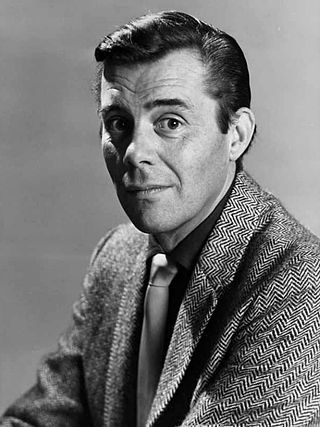
Sir Dirk Bogarde was an English actor, novelist and screenwriter. Initially a matinée idol in films such as Doctor in the House (1954) for the Rank Organisation, he later acted in art house films, evolving from "heartthrob to icon of edginess".

Victim is a 1961 British neo-noir suspense film directed by Basil Dearden and starring Dirk Bogarde and Sylvia Syms. The first British film to explicitly name homosexuality and deal with it sympathetically, it premiered in the UK on 31 August 1961 and in the US the following February.
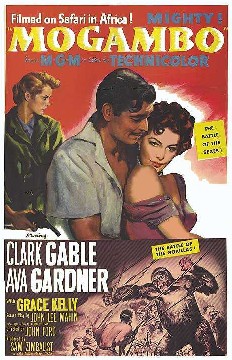
Mogambo is a 1953 Technicolor adventure/romantic drama film directed by John Ford and starring Clark Gable, Ava Gardner, and Grace Kelly, and featuring Donald Sinden. Shot on location in Equatorial Africa, with a musical soundtrack consisting entirely of actual African tribal music recorded in the Congo, the film was adapted by John Lee Mahin from the play Red Dust by Wilson Collison. The picture is a remake of Red Dust (1932), which was set in Vietnam and also starred Gable in the same role.

The Cruel Sea is a 1953 British war film based on the novel of the same title by Nicholas Monsarrat. The film starred Jack Hawkins, Donald Sinden, Denholm Elliott, Stanley Baker, Liam Redmond, Virginia McKenna and Moira Lister. The movie was made by Ealing Studios seven years after the end of the Second World War, and was directed by Charles Frend and produced by Leslie Norman.

Doctor in the House is a 1954 British comedy film directed by Ralph Thomas and starring Kenneth More, Donald Sinden, Donald Houston and James Robertson Justice. It was produced by Betty Box. The screenplay, by Nicholas Phipps, Richard Gordon and Ronald Wilkinson, is based on the 1952 novel of the same name by Gordon, and follows a group of students through medical school.

Dame Virginia Anne McKenna is a British stage and screen actress, author, animal rights activist, and wildlife campaigner. She is best known for the films A Town Like Alice (1956), Carve Her Name with Pride (1958), Born Free (1966), and Ring of Bright Water (1969), as well as her work with the Born Free Foundation.
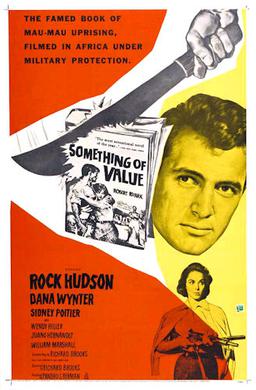
Something of Value is a 1957 American drama film directed by Richard Brooks and starring Rock Hudson, Dana Wynter, and Sidney Poitier. The film was reissued under the title Africa Ablaze.
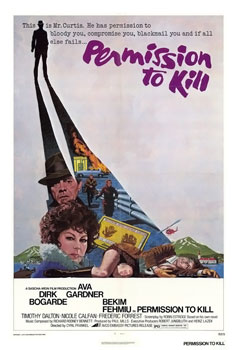
Permission to Kill is a 1975 Austrian/American/British spy thriller film directed by Cyril Frankel and starring Dirk Bogarde, Ava Gardner and Bekim Fehmiu with Timothy Dalton, Nicole Calfan and Frederic Forrest. It was produced by Paul Mills from a screenplay by Robin Estridge, made by Sascha-Verleih and distributed by AVCO Embassy Pictures. The film had original music by Richard Rodney Bennett and the cinematography was by Freddie Young.

The Planter's Wife is a 1952 British war drama film directed by Ken Annakin, and starring Claudette Colbert, Jack Hawkins and Anthony Steel. It is set against the backdrop of the Malayan Emergency and focuses on a rubber planter and his neighbours who are fending off a campaign of sustained attacks by Communist insurgents while also struggling to save their marriage.

Dark of the Sun is a 1968 British adventure war film starring Rod Taylor, Yvette Mimieux, Jim Brown, and Peter Carsten. The film, which was directed by Jack Cardiff, is based on Wilbur Smith's 1965 novel, The Dark of the Sun. The story about a band of mercenaries sent on a dangerous mission during the Congo Crisis was adapted into a screenplay by Ranald MacDougall. Critics condemned the film on its original release for its graphic scenes of violence and torture.
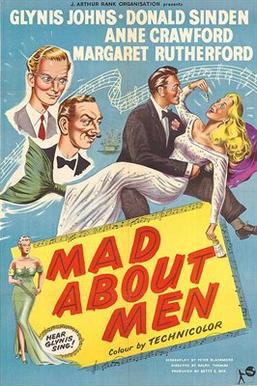
Mad About Men is a 1954 British Technicolor comedy film directed by Ralph Thomas and starring Glynis Johns, Donald Sinden, Anne Crawford and Margaret Rutherford. It was written by Peter Blackmore, who also wrote the 1948 film Miranda which preceded Mad About Men. Johns appears in both films as the mermaid Miranda. However, Rank Films insisted it was not a sequel.
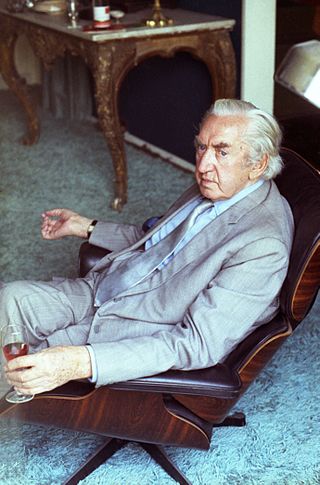
Brian Desmond Hurst was an Irish film director. With over thirty films in his filmography, Hurst was hailed as Northern Ireland's best film director by BBC film critic Mike Catto. He is perhaps best known for the 1951 A Christmas Carol adaptation Scrooge.

Boys in Brown is a 1949 black and white British drama film directed by Montgomery Tully, which depicts life in a borstal for young offenders. It stars Jack Warner, Richard Attenborough, Dirk Bogarde and Jimmy Hanley. It is based on a 1940 play by the actor Reginald Beckwith.

The Captain's Table is a 1959 British comedy film directed by Jack Lee and starring John Gregson, Donald Sinden, Peggy Cummins and Nadia Gray. The film is based on the 1954 novel of the same title by Richard Gordon, later adapted into the 1971 German film The Captain starring Heinz Rühmann.
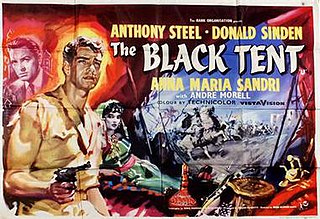
The Black Tent is a 1956 British war film directed by Brian Desmond Hurst and starring Donald Sinden, Anthony Steel, Anna Maria Sandri, André Morell and Donald Pleasence. It is set in North Africa, during the Second World War and was filmed on location in Libya.
Earl St. John was an American film producer in overall charge of production for The Rank Organisation at Pinewood Studios from 1950 to 1964, and was credited as executive producer on 131 films. He was known as the "Earl of Pinewood". John Davis of Rank called him "the greatest showman that The Rank Organisation has ever had, and probably the greatest showman to have lived in this country. "

Doctor at Large is a 1957 British comedy film directed by Ralph Thomas starring Dirk Bogarde, Muriel Pavlow, Donald Sinden, James Robertson Justice and Shirley Eaton. It is the third of the seven films in the Doctor series, and is based on the 1955 novel of the same title by Richard Gordon.
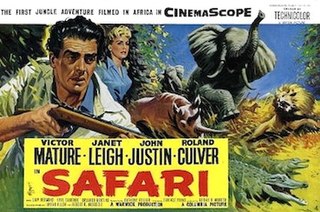
Safari is a 1956 British CinemaScope adventure film directed by Terence Young and set during the Mau Mau Uprising in Kenya. It stars Victor Mature, Janet Leigh, Roland Culver, John Justin, and Earl Cameron, and was intentionally cast to attract an American audience—both the hero and the lead female character are Americans, played by American actors.

The High Bright Sun is a 1964 British action film directed by Ralph Thomas and starring Dirk Bogarde, George Chakiris and Susan Strasberg. It is set in Cyprus during the EOKA uprising against British rule in the 1950s. It was based on a 1962 novel by Ian Stuart Black.
Operation Anvil was a British military operation during the Mau Mau Uprising where British troops attempted to remove suspected Mau Mau from Nairobi and place them in Langata Camp or reserves. The operation began on 24 April 1954 and took two weeks, at the end of which 20,000 Mau Mau suspects had been taken to Langata, and 30,000 more had been deported to the reserves.


















